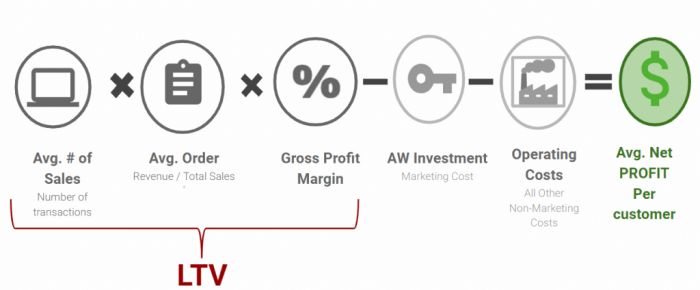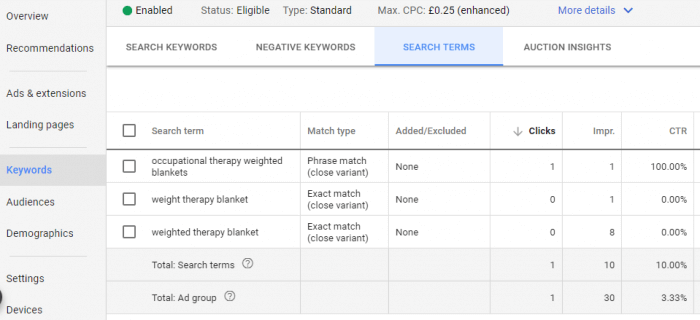5 Common Google Ads Mistakes To Avoid
Google Ads are a science and an art. Here's how to master both.

Google Ads is a powerful platform for advertising your business on Google’s search results pages, Google Display Network and YouTube. It is no surprise that the single biggest source of income for Google is paid advertising. In 2018 alone, Google’s advertising revenue amounted to 116.32 billion USD.
Although setting up a Google Ads account is fairly straightforward, mastering this platform can be difficult, and mistakes are made even by the most experienced advertisers. To help you get the most out of your ad spend, Hallam has identified 5 common Google Ads mistakes to avoid.
1. Advertising without understanding profit margins
The primary goal for most business’ advertising activity is generating sales or leads. Whilst increasing brand awareness and gaining traffic is important when it comes to advertising, achieving a significant return on an ad spend enables a business to secure more budget.
To be able to accurately measure the performance of a campaign, and optimise accordingly, advertisers must have a clear understanding of their profit margins. It is necessary to be aware of exactly how much you can afford to pay for a lead in addition to the percentage of leads that your team converts to sales.
Another valuable use of time is to work out the lifetime value of a new customer and the average net profit per customer you acquire. The diagram below shows how to calculate this:

At the very least, advertisers should spend time working out target returns on ad spend (ROAS) and breaking this down by product or service category. Following this, you can optimise your bidding strategy and account to achieve your desired outcomes.
2. Forgetting to set up conversions
It is highly beneficial to set up conversions for sales or enquiries so that return on investment can be measured. This also enables you to gain a clearer understanding of your profit margins, so that you can set a price per click which will not lose you money.
Setting up conversions in Google Ads is easy; simply select conversions from the ‘Tools’ menu option and add a new conversion. If you already have these set up, import conversions from Google Analytics.
Before moving on to test whether or not your conversions work, you need to check for and remove any duplicate conversion actions, particularly with Google Ads and the imported Google Analytics data.
After this, use the following formula to understand the cost per sale of each product. If your Google Advertising cost per click is £0.42 and your site conversion rate is 3% then the advertising cost of a lead will be: £0.42 x 100 divided by 3 which equals = £14. For every 100 clicks, you will get 3 orders at a cost of £14 per lead.
3. Bidding too high
Often, businesses will bid for position 1, just because they want to be number 1. This is not always wise, especially if little consideration is made on cost per lead or return on ad spend.
Setting the price too high for price per click is often problematic as you will drive the cost of advertising up. This often leads to bidding wars with competitors who will increase their bids to match your own.
A lot of the time, bidding lower has a better outcome, as this enables you to maximise the number of clicks for your budget as well as the quantity of and cost per conversion.
4. Leaving your Google Ads account to run unmanaged
Though it may sound obvious, the worst mistake you can make is leaving your account to run unsupervised. Without frequent management and reviews, the performance of your campaign will deteriorate and costs will increase.
Here are some ways to avoid this:
● Invest time in managing your account to optimise performance from the start. Review keywords regularly and see which phrases are driving traffic and sales.
Typical tasks involve: adjusting bid prices and bidding strategies, reviewing search terms, adding new keywords and campaigns, creating new ad copy, addressing low click-through rates and quality score.
● If you don’t have time to manage your account, then get a Google Ads Premier Partner accredited agency to manage it for you.
● Set up automated reports in Google Ads to email data to you weekly. Reading these reports in depth allows you to identify new keywords to add to your account, as well as identify where you may be wasting money.
5. Failing to monitor search queries and keywords
Google Ads enables you to see the words and phrases that triggered clicks on your ads. To refine the performance of you account, it is necessary to review search terms regularly.
You can identify negative keywords by using the ‘Search Terms Report’ feature. This can be found in the keywords tab within your campaign or Ad Group. Identifying negative keywords and adding them to your account is beneficial as this enables you to stop your adverts appearing for phrases which are not relevant.

For those running Google Shopping Campaigns, funneling search queries with different levels of intent is highly recommended. This can be carried out using the campaign priority settings.
You should also spend time refining keyword types. When you add a keyword into your Google Ads account, it will automatically default to the ‘broach match’ match type.
These keywords commonly attract clicks for queries that are not relevant to your advertising objectives, and this can be costly if not managed carefully.
You should therefore use a combination of broad match modified keywords and exact match keywords within your account in order to achieve optimal clicks and impressions.
If you are unsure of what match types are in your account, click on the columns option when you are in the keywords tab, and then select ‘customise heading’ , followed by ‘attributes’, and then tick ‘match type’.
Pete Keyworth is Digital Marketing Consultant at Hallam.
Thanks for signing up to Minutehack alerts.
Brilliant editorials heading your way soon.
Okay, Thanks!